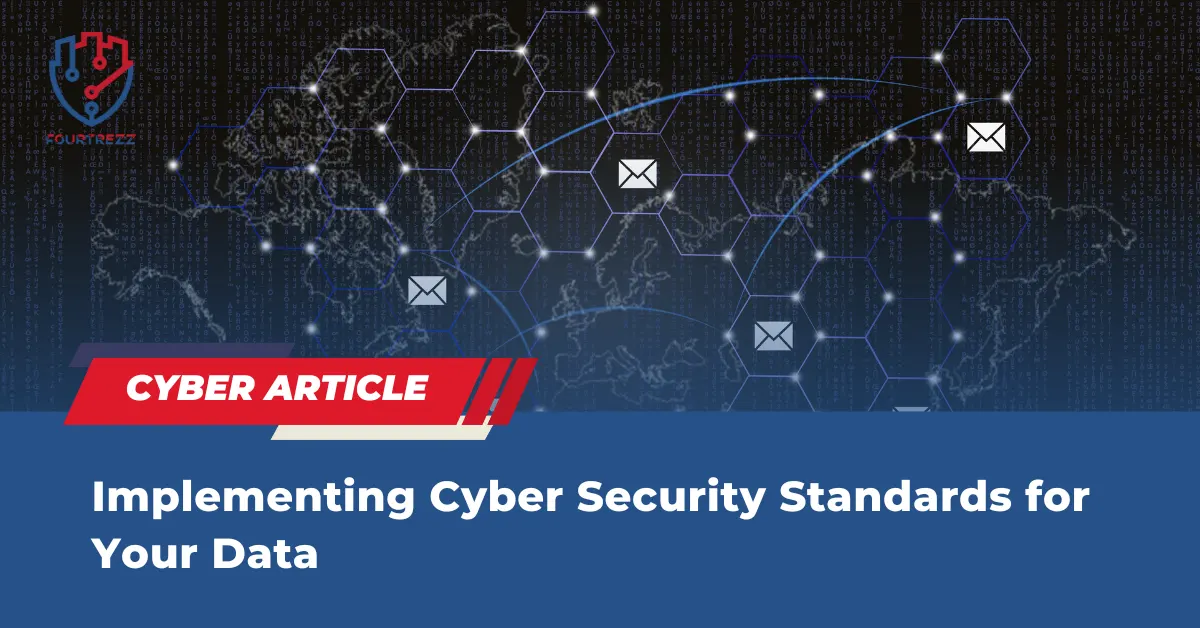Selasa, 5 Desember 2023 | 6 min read | Andhika R
Implementing Cyber Security Standards for Your Data
Data security has become vitally important for both companies and individuals. In facing the ever-evolving threats of the cyber world, it's no surprise that the risk of sensitive data breaches is on the rise. Sensitive data leaks can lead to significant losses, such as reputation damage, financial loss, and even legal action. Therefore, maintaining data security is a necessity.
This article aims to provide guidance for companies and individuals on how to implement security standards to protect their sensitive data. It will also discuss ways to maintain company data security, protect information security systems, and enhance network security systems. By reading this article, readers are expected to gain a better understanding of the importance of cyber security and how to secure their data.

Identify Sensitive Data
Before discussing how to protect sensitive data, we first need to understand what sensitive data is. Sensitive data refers to information that, if accessed by unauthorized parties, can cause significant harm to a company or individual.
Examples of sensitive data include personal information such as identity numbers, birth dates, and addresses; financial information like credit card numbers and bank details; medical information; and business secrets such as product designs and client information.
Identifying sensitive data is crucial as it helps companies or individuals determine what security measures need to be taken to protect this information. By recognizing which data is sensitive, companies or individuals can set appropriate security standards and protect their data from cyber threats. Additionally, identifying sensitive data also helps companies or individuals comply with applicable privacy and data security regulations.
Security Standards to Protect Sensitive Data
After identifying sensitive data, the next step is to implement security standards to protect this data. Here are some security standards that can be applied:
- Implementing Data Security Policies
Implementing data security policies is a crucial step in protecting sensitive data. These policies should include procedures for managing, accessing, and maintaining the security of the data. Moreover, they should also include steps to prevent data loss and protect against cyber threats.
- Applying Data Encryption
Data encryption involves converting data into a format unreadable by unauthorized parties. By applying data encryption, companies or individuals can protect their sensitive data from theft or unauthorized access. Encryption can be applied to emails, files, and even entire information systems.
- Using SSL/TLS Certificates on Websites
Using SSL/TLS certificates on websites helps protect sensitive data during internet transfers. These certificates encrypt information transferred between servers and users, preventing unauthorized parties from stealing the information. Using SSL/TLS certificates can also boost user trust in a company's website.
- Enabling Password Protection
Enabling password protection is a simple yet effective security measure for protecting sensitive data. Ensure the use of strong and complex passwords, and change them regularly. Also, ensure that these passwords are not used across multiple accounts.
- Regular Data Backups
Regular data backups help companies or individuals recover lost data or data compromised by security breaches. Ensure that data backups are stored securely and updated regularly.
By implementing these security standards, companies or individuals can enhance the security of their sensitive data and reduce the risk of data breaches. However, it is important to remember that good security standards must be strictly followed and updated regularly.
Best Practices for Implementing Security Standards
Once you have identified the sensitive data that needs protection, the next step is to apply best practices for maintaining its security. Here are some best practices:
- Employee Training on Data Security
It's vital for every employee to understand and value the security of sensitive data. In this training, employees can learn about the company's data security policies, identify sensitive data, and implement appropriate security practices. By involving all employees in this training, companies can ensure that everyone understands the importance of securing sensitive data.
- Regular Security Audits
Regular security audits help identify potential security gaps in the company's system. During these audits, companies can assess whether the security practices in place are adequate or need improvement. Regular audits can prevent more significant security breaches in the future.
- Using Up-to-Date Security Software
Security software such as antivirus and firewalls are essential tools for protecting company systems from emerging security threats. Ensure that the security software used is always up to date to ensure the protection of sensitive data.
- Carefully Managing Access to Sensitive Data
Ensure that only employees who need access to sensitive data are granted it. Careful data access management can help prevent data breaches caused by human error or unauthorized access.
- Deleting Unnecessary Data
Sensitive data that is no longer needed should be promptly deleted. Removing unnecessary data can help minimize the risk of sensitive data leaks due to data loss or system hacking.
By implementing the best practices described above, companies can ensure that their sensitive data is well-protected and safe from the risk of data breaches.
Conclusion
In today's digital era, data security is of utmost importance. Sensitive data such as personal information, financial information, and company secrets must be protected from threats of leakage and misuse. Therefore, companies and individuals must implement appropriate security standards to protect their sensitive data.
Identifying sensitive data is important as it makes it easier to recognize what types of data need to be protected with stricter security standards. Sensitive data can include personal details like full names, addresses, birth dates, phone numbers, or financial data such as credit card numbers, bank account numbers, or insurance numbers. It is important to identify sensitive data as it is a primary target for cybercriminals.
After identifying sensitive data, there are several security standards that need to be implemented to protect it. First, companies should have clear and consistently applied data security policies. Second, sensitive data should be encrypted to protect it from unauthorized access. Third, companies should use SSL/TLS certificates on websites to protect online data transmission. Fourth, it is crucial to enable strong and unique password protection. Fifth, companies should regularly back up data to minimize the risk of data loss.
Additionally, there are several best practices that can be implemented to apply security standards more effectively. Training company employees on data security, conducting regular security audits, using up-to-date security software, carefully managing access to sensitive data, and deleting unnecessary data are some actions that can enhance data security.
The importance of implementing security standards to protect sensitive data cannot be overstated. By taking the right actions, we can minimize the risk of sensitive data breaches and maintain data privacy and security. Therefore, I urge all parties to take action to protect sensitive data by implementing the appropriate security standards.
Andhika RDigital Marketing at Fourtrezz
Artikel Terpopuler
Tags: Cyber Security, Attack Path, Penetration Testing, Manajemen Risiko, Keamanan Data
Baca SelengkapnyaBerita Teratas
Berlangganan Newsletter FOURTREZZ
Jadilah yang pertama tahu mengenai artikel baru, produk, event, dan promosi.



